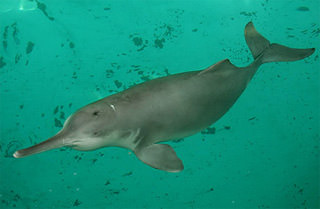Yangtze River Dolphin, We Hardly Knew You
If you've been putting off that trip to see China's "goddess of the Yangtze," you've waited too long. Scientists believe the human-sized dolphin to be the first aquatic mammal species to go extinct in half a century, a victim of China's economic growth.
If you’ve been putting off that trip to see China’s “goddess of the Yangtze,” you’ve waited too long. Scientists believe the human-sized dolphin to be the first aquatic mammal species to go extinct in half a century, a victim of China’s economic growth.
Your support matters…Time:
The Yangtze River dolphin, one of the world’s rarest mammals, is no more, a victim of China’s breakneck economic growth and competition for food with one of the world’s most common large mammals — human beings.
“We can say that the animal is functionally extinct,” says August Pfluger, head of the Zurich-based Baiji.org Foundation, which in December co-sponsored a six-week, 2,000-mile (3,500-km) survey of the Yangtze without finding a single remaining member of the critically endangered species. The dolphin, one of only four exclusively freshwater species in the world, may have the unhappy distinction of being the first aquatic mammal to go extinct in more than half a century — and the first large mammal driven into oblivion by environmental degradation.
Nicknamed the “goddess of the Yangtze,” and long considered auspicious by fishermen, the pale-colored, human-sized dolphins have always been rare: a 1997 survey recorded only 14 left in the river. (A captive dolphin died of old age in a Chinese zoo in 2002). But Pfluger says human pressure pushed the baiji past the tipping point. “The main reason is overfishing. The Chinese still use unsustainable fishing methods like dynamite. There’s still a lot of illegal fishing, so the dolphins were competing with humans for food.”
Independent journalism is under threat and overshadowed by heavily funded mainstream media.
You can help level the playing field. Become a member.
Your tax-deductible contribution keeps us digging beneath the headlines to give you thought-provoking, investigative reporting and analysis that unearths what's really happening- without compromise.
Give today to support our courageous, independent journalists.






You need to be a supporter to comment.
There are currently no responses to this article.
Be the first to respond.